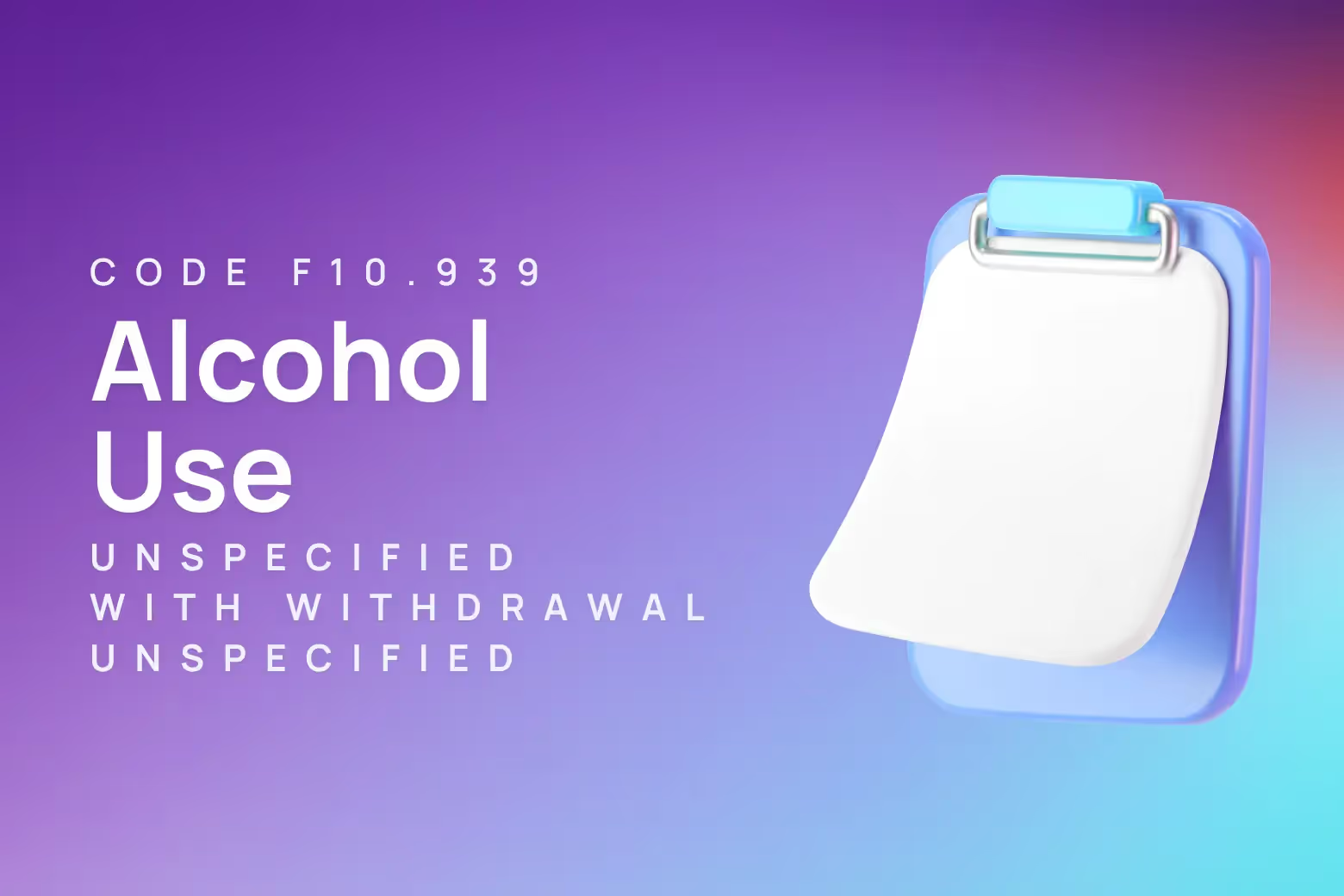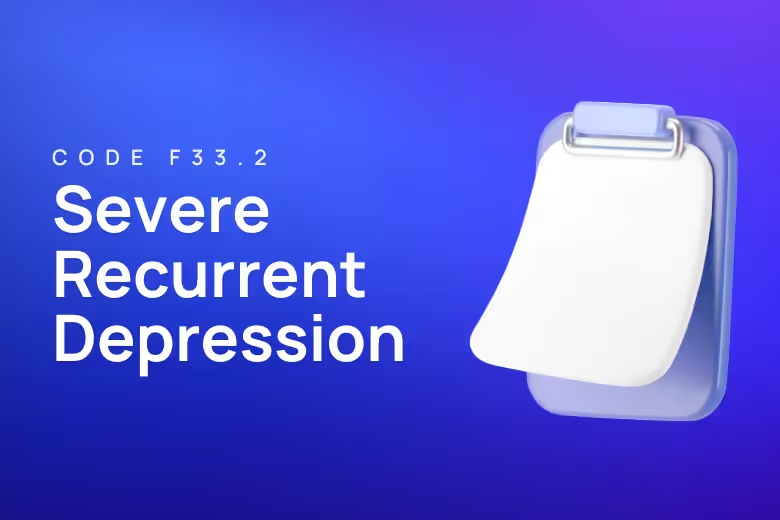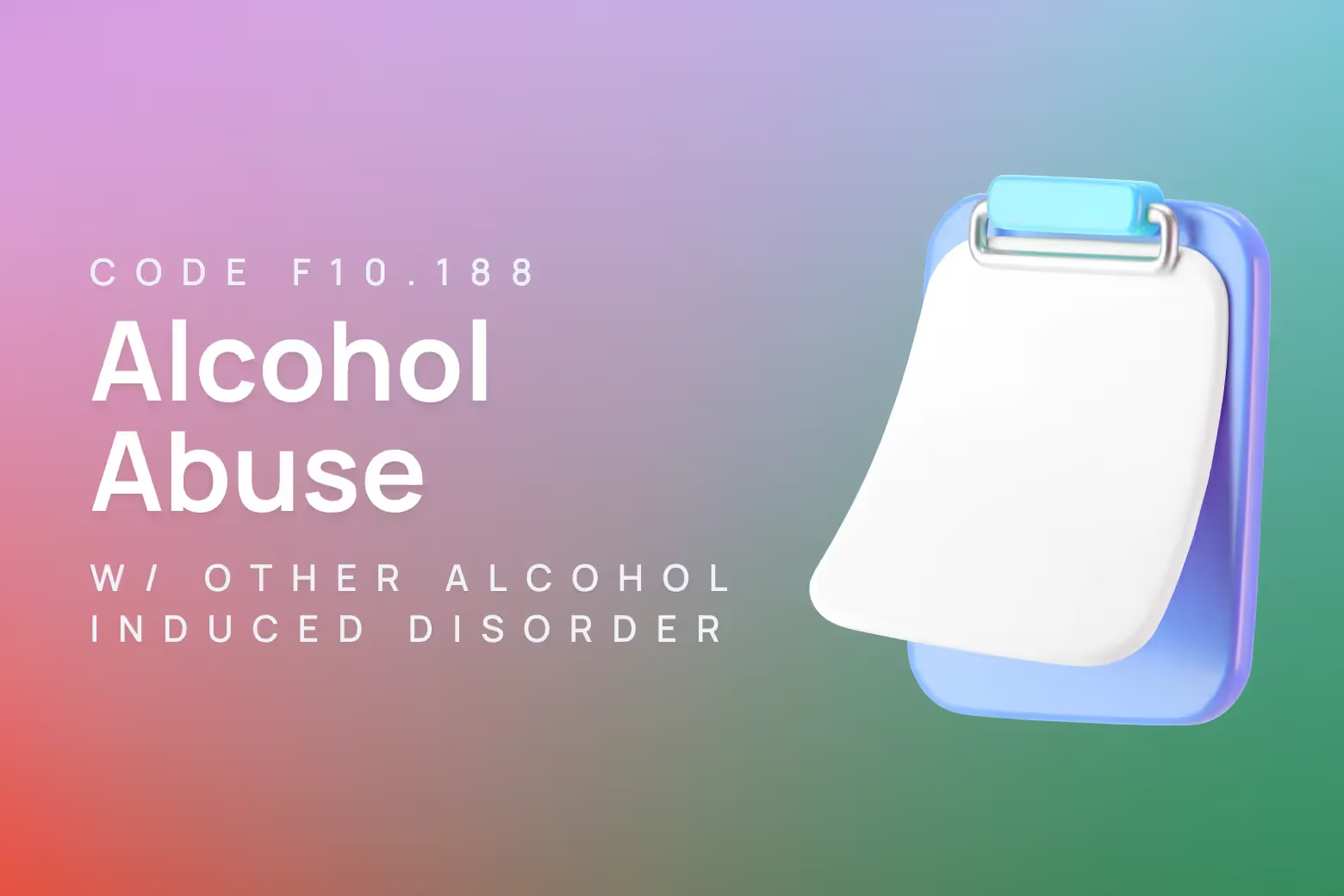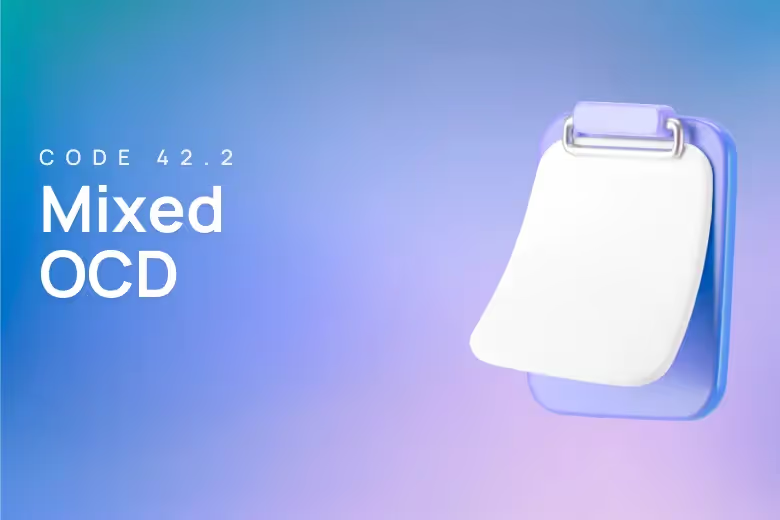ICD-10 code for alcohol use, unspecified with withdrawal, unspecified

F10.939 is the ICD-10 code for alcohol use, unspecified with withdrawal, unspecified.
This diagnosis applies when clinicians identify alcohol withdrawal symptoms but cannot determine the specific severity of the underlying alcohol use disorder or the exact nature of the withdrawal presentation.
Accurate diagnosis remains crucial for appropriate treatment planning and ensuring clients receive comprehensive care during this vulnerable period.
Key features:
- Used when alcohol withdrawal is present but specific details cannot be determined
- Applies across mild, moderate, or severe alcohol use patterns when severity is unclear
- Covers withdrawal symptoms ranging from uncomplicated to more complex presentations
- Essential for documenting alcohol-related care when complete diagnostic information is unavailable

Diagnostic criteria for alcohol use with withdrawal (F10.939)
Clinicians assign F10.939 when alcohol withdrawal symptoms are evident but specific diagnostic details remain unclear.
This code serves as a bridge diagnosis when comprehensive assessment is challenging due to clinical circumstances or limited information availability.
The underlying alcohol use disorder requires at least two symptoms within a 12-month period. These include:
- consuming larger amounts than intended
- persistent unsuccessful attempts to reduce use
- spending excessive time obtaining or using alcohol
- experiencing strong cravings
Additional criteria encompass role impairment, continued use despite interpersonal problems, and abandoning important activities for alcohol consumption.
Withdrawal manifestation becmes the distinguishing feature for this code series. Alcohol withdrawal typically emerges within 6-24 hours after the last drink, though timing can vary significantly based on individual factors and drinking patterns.
Key withdrawal indicators include:
- Autonomic hyperactivity with sweating, eleated heart rate, and blood pressure changes
- Hand tremor and potential fever development
- Gastrointestinal symptoms including nausea, vomiting, and appetite loss
- Psychological symptoms such as anxiety, agitation, and sleep disturbances
- Possible perceptual disturbances or cognitive changes
The "unspecified" designation acknowledges diagnostic uncertainty regarding both the alcohol use severity and specific withdrawal characteristics, making this code particularly valuable in emergency settings or initial clinical encounters.
When to use F10.939 diagnosis code
Differential diagnosis becomes critical when determining appropriate alcohol-related coding. F10.939 serves specific clinical situations where precision remains limited but withdrawal symptoms require documentation.
F10.939 vs F10.930 (Alcohol use, unspecified with withdrawal, uncomplicated)
Use F10.939 when withdrawal symptoms are present but their specific nature remains unclear. This broader code captures situations where clinicians cannot confidently categorize withdrawal as uncomplicated, leaving room for diagnostic uncertainty.
F10.930 requires clear evidence that withdrawal symptoms remain straightforward without complications like delirium or perceptual disturbances. Choose this more specific code when clinical presentation clearly indicates uncomplicated withdrawal patterns.
F10.939 vs F10.931 (Alcohol use, unspecified with withdrawal, delirium)
F10.939 applies when delirium presence cannot be definitively established or ruled out during initial assessment. This diagnostic flexibility accommodates clinical situations where mental status evaluation remains incomplete.
F10.931 demands clear evidence of delirium tremens or alcohol withdrawal delirium, characterized by confusion, disorientation, and significant cognitive disturbance. Reserve this specific code for confirmed delirium presentations requiring intensive medical management.
F10.939 vs F10.932 (Alcohol use, unspecified with withdrawal, with perceptual disturbance)
Select F10.939 when perceptual symptoms may be present but require further clarification or assessment. This code acknowledges diagnostic uncertainty while ensuring appropriate clinical attention to potential complications.
F10.932 specifically identifies clear perceptual disturbances such as visual, auditory, or tactile hallucinations without delirium. Use this code when hallucinations are documented but consciousness remains relatively intact.
Related ICD-10 codes
Related alcohol use disorder codes within the F10.9 family include:
- F10.93 - Alcohol use, unspecified with withdrawal (parent category)
- F10.930 - Alcohol use, unspecified with withdrawal, uncomplicated
- F10.931 - Alcohol use, unspecified with withdrawal, delirium
- F10.932 - Alcohol use, unspecified with withdrawal, with perceptual disturbance
- F10.10 - Alcohol use disorder, mild
- F10.20 - Alcohol use disorder, moderate or severe
- F10.239 - Alcohol dependence with withdrawal, unspecified
Interventions and CPT codes for alcohol use with withdrawal
Evidence-based treatment approaches address both immediate withdrawal management and underlying alcohol use patterns. Comprehensive care requires careful symptom monitoring alongside therapeutic intervention planning.
Psychotherapy interventions
Individual psychotherapy forms the foundation of alcohol use treatment across all severity levels. Cognitive behavioral therapy demonstrates strong efficacy for alcohol dependence, helping clients identify triggers and develop healthy coping mechanisms.
Motivational interviewing proves particularly valuable for engaging ambivalent clients and strengthening commitment to change.
- 90791 - Psychiatric diagnostic evaluation for comprehensive initial assessment
- 90834 - Psychotherapy, 45 minutes for standard individual therapy sessions
- 90837 - Psychotherapy, 60 minutes for intensive individual treatment
Family and group interventions
Family involvement becomes crucial when addressing alcohol use disorders, as interpersonal dynamics often contribute to drinking patterns and recovery success.
Group therapy provides peer support and shared learning experiences that individual treatment cannot replicate.
- 90846 - Family psychotherapy without patient present
- 90847 - Family psychotherapy with patient present
- 90853 - Group psychotherapy for structured group sessions
Screening and brief intervention
Systematic screening identifies alcohol-related problems early and enables timely intervention. Brief interventions prove effective for reducing consumption and preventing progression to more severe alcohol use disorders.
- 99408 - Alcohol screening and brief intervention, 15-30 minutes
- 99409 - Alcohol screening and brief intervention, greater than 30 minutes
- G0396 - Structured assessment and brief intervention, 15-30 minutes (Medicare)
- H0049 - Alcohol screening per standardized instrument
- H0050 - Alcohol brief intervention, per 15 minutes
Crisis management
Alcohol withdrawal can present medical emergencies requiring immediate clinical attention. Crisis intervention codes capture intensive therapeutic work during acute episodes.
- 90839 - Psychotherapy for crisis, first 60 minutes
- 90840 - Psychotherapy for crisis, each additional 30 minutes
How Upheal improves F10.939 ICD-10 documentation
Suggesting appropriate ICD-10 codes based on session content
Upheal's clinical documentation platform analyzes therapy session content to identify relevant diagnostic indicators and withdrawal symptoms.
The system recognizes patterns in client presentation that align with F10.939 criteria, helping clinicians capture important diagnostic nuances they might otherwise overlook.
When clients describe drinking patterns alongside physical or psychological symptoms suggesting withdrawal, Upheal flags these connections and suggests appropriate coding considerations.
This automated analysis reduces diagnostic oversights while supporting thorough clinical assessment.
Maintaining HIPAA-compliant records with proper diagnostic coding
Accurate diagnostic coding requires comprehensive documentation that meets both clinical and regulatory standards.
Upheal ensures that F10.939 diagnoses include sufficient supporting evidence while maintaining strict HIPAA compliance throughout the documentation process.
The platform automatically organizes withdrawal symptom descriptions, treatment responses, and assessment findings into structured clinical notes.
This systematic approach creates defensible diagnostic documentation that supports appropriate billing and continuity of care.
Reducing administrative burden so you can focus on client care
Manual documentation of complex alcohol use presentations consumes valuable clinical time that could be spent on direct client care.
Upheal automates routine documentation tasks, allowing clinicians to concentrate on the nuanced assessment and treatment planning that clients with withdrawal symptoms require.
The platform streamlines the process of connecting session observations to appropriate ICD-10 codes, reducing the cognitive load of simultaneous clinical work and administrative tasks.
This efficiency proves particularly valuable when working with clients experiencing withdrawal symptoms who need focused therapeutic attention.
Supporting clients with alcohol use and withdrawal
Clients experiencing alcohol withdrawal require compassionate care that addresses both immediate symptom management and long-term recovery planning.
The acute nature of withdrawal symptoms often creates anxiety and physical discomfort that can interfere with therapeutic engagement, making the therapeutic relationship even more crucial.
Successful treatment begins with thorough assessment of withdrawal severity and associated medical risks.
Clinicians must remain vigilant for signs of serious complications while building rapport and trust with clients who may feel vulnerable or ashamed about their alcohol use patterns.
Creating a supportive environment that normalizes the withdrawal experience while emphasizing hope for recovery helps clients engage more fully in treatment.
Clear communication about what to expect during the withdrawal process reduces anxiety and builds confidence in the treatment approach.
Upheal's clinical documentation platform helps clinicians maintain detailed records of client progress while spending more quality time on the therapeutic relationship.
The platform's automated note-taking captures important clinical details without disrupting the flow of therapy sessions.
Try Upheal for free to see how improved documentation can support better outcomes for clients with alcohol use and withdrawal concerns.













